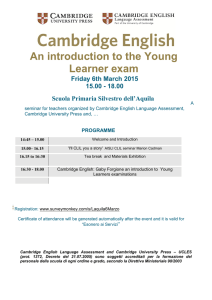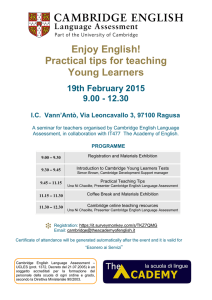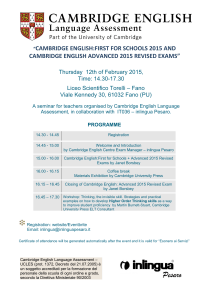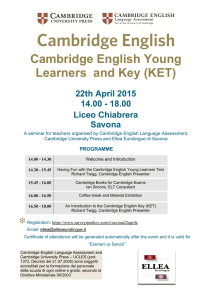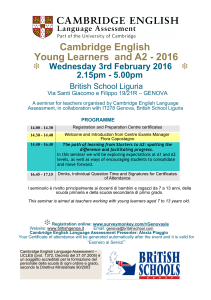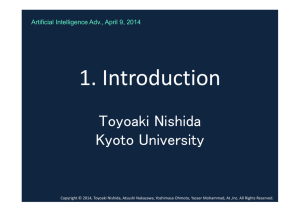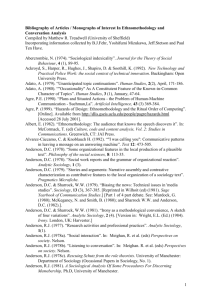Heritage, John, Raymond, Geoffrey, 2005
advertisement
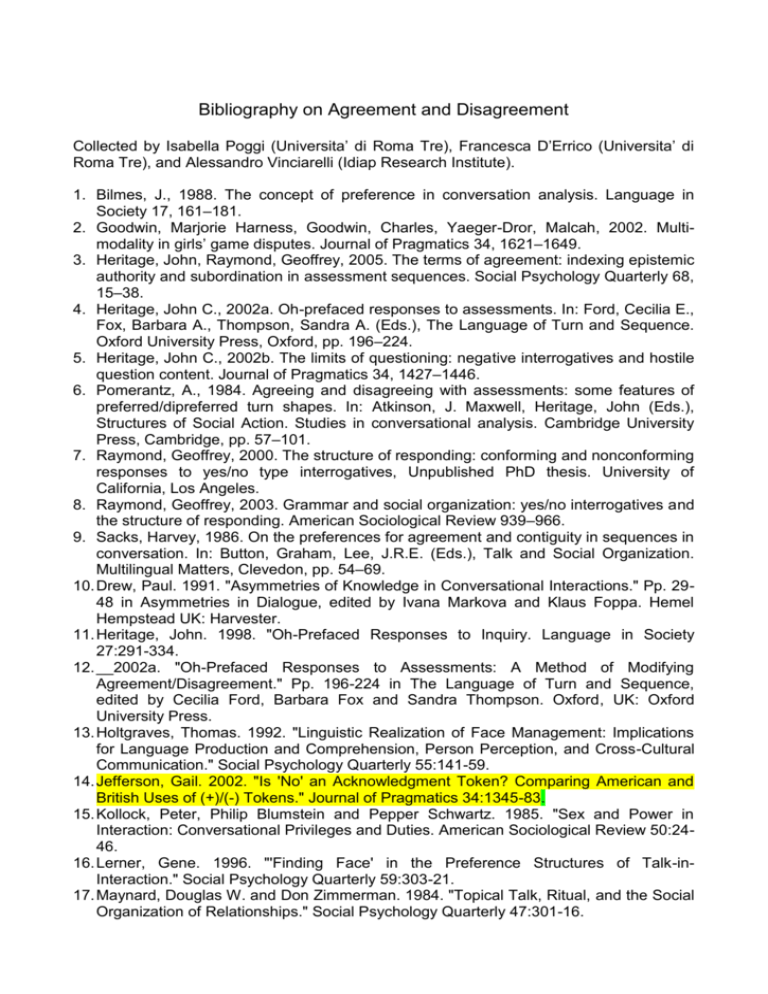
Bibliography on Agreement and Disagreement Collected by Isabella Poggi (Universita’ di Roma Tre), Francesca D’Errico (Universita’ di Roma Tre), and Alessandro Vinciarelli (Idiap Research Institute). 1. Bilmes, J., 1988. The concept of preference in conversation analysis. Language in Society 17, 161–181. 2. Goodwin, Marjorie Harness, Goodwin, Charles, Yaeger-Dror, Malcah, 2002. Multimodality in girls’ game disputes. Journal of Pragmatics 34, 1621–1649. 3. Heritage, John, Raymond, Geoffrey, 2005. The terms of agreement: indexing epistemic authority and subordination in assessment sequences. Social Psychology Quarterly 68, 15–38. 4. Heritage, John C., 2002a. Oh-prefaced responses to assessments. In: Ford, Cecilia E., Fox, Barbara A., Thompson, Sandra A. (Eds.), The Language of Turn and Sequence. Oxford University Press, Oxford, pp. 196–224. 5. Heritage, John C., 2002b. The limits of questioning: negative interrogatives and hostile question content. Journal of Pragmatics 34, 1427–1446. 6. Pomerantz, A., 1984. Agreeing and disagreeing with assessments: some features of preferred/dipreferred turn shapes. In: Atkinson, J. Maxwell, Heritage, John (Eds.), Structures of Social Action. Studies in conversational analysis. Cambridge University Press, Cambridge, pp. 57–101. 7. Raymond, Geoffrey, 2000. The structure of responding: conforming and nonconforming responses to yes/no type interrogatives, Unpublished PhD thesis. University of California, Los Angeles. 8. Raymond, Geoffrey, 2003. Grammar and social organization: yes/no interrogatives and the structure of responding. American Sociological Review 939–966. 9. Sacks, Harvey, 1986. On the preferences for agreement and contiguity in sequences in conversation. In: Button, Graham, Lee, J.R.E. (Eds.), Talk and Social Organization. Multilingual Matters, Clevedon, pp. 54–69. 10. Drew, Paul. 1991. "Asymmetries of Knowledge in Conversational Interactions." Pp. 2948 in Asymmetries in Dialogue, edited by Ivana Markova and Klaus Foppa. Hemel Hempstead UK: Harvester. 11. Heritage, John. 1998. "Oh-Prefaced Responses to Inquiry. Language in Society 27:291-334. 12. __2002a. "Oh-Prefaced Responses to Assessments: A Method of Modifying Agreement/Disagreement." Pp. 196-224 in The Language of Turn and Sequence, edited by Cecilia Ford, Barbara Fox and Sandra Thompson. Oxford, UK: Oxford University Press. 13. Holtgraves, Thomas. 1992. "Linguistic Realization of Face Management: Implications for Language Production and Comprehension, Person Perception, and Cross-Cultural Communication." Social Psychology Quarterly 55:141-59. 14. Jefferson, Gail. 2002. "Is 'No' an Acknowledgment Token? Comparing American and British Uses of (+)/(-) Tokens." Journal of Pragmatics 34:1345-83. 15. Kollock, Peter, Philip Blumstein and Pepper Schwartz. 1985. "Sex and Power in Interaction: Conversational Privileges and Duties. American Sociological Review 50:2446. 16. Lerner, Gene. 1996. "'Finding Face' in the Preference Structures of Talk-inInteraction." Social Psychology Quarterly 59:303-21. 17. Maynard, Douglas W. and Don Zimmerman. 1984. "Topical Talk, Ritual, and the Social Organization of Relationships." Social Psychology Quarterly 47:301-16. 18. O'Barr, William N. and Bowman K. Atkins. 1980. "'Women's Langauge' or 'Powerless Language.'" Pp. 93-110 in Women and Language in Literature and Society, edited by Sally McConnell-Ginet, Ruth Borker, and Nelly Furman. New York: Praeger. 19. Pomerantz, Anita. 1978. "Compliment Responses: Notes on the Co-Operation of Multiple Constraints." Pp. 79-112 in Studies in the Organization of Conversational Interaction, edited by Jim Schenkein. New York: Academic Press. 20. Pomerantz, Anita. 1984. "Agreeing and Disagreeing With Assessments: Some Features of Preferred/Dispreferred Turn Shapes." Pp. 57-101 in Structures of Social Action: Studies in Conversation Analysis, edited by J. Maxwell Atkinson and John Heritage. Cambridge, UK: Cambridge University Press. 21. Raymond, Geoffrey. 2000. "The Voice of Authority: The Local Accomplishment of Authoritative Discourse in Live News Broadcasts." Discourse Studies 2:354-79. . 22. __2003. "Grammar and Social Organization: Yes/No Type Interrogatives and the Structure of Responding." American Sociological Review, 68:939-67. 23. ___ 2004. "Prompting Action: The Stand- Alone "So" in Ordinary Conversation." Research on Language and Social Interaction, 37:185-218. 24. Roth, Andrew. 2002. "Social Epistemology in Broadcast News Interviews. Language in Society 31:355-81. 25. Sacks, Harvey. 1984. "On Doing 'Being Ordinary."' Pp. 413-29 in Structures of Social Action: Studies in Conversation Analysis, edited by J. Maxwell Atkinson and John Heritage. Cambridge, UK: Cambridge University Press. . 26. __1987. "On the Preferences for Agreement and Contiguity in Sequences in Conversation." Pp. 54-69 in Talk and Social Organisation, edited by Graham Button and John R. E. Lee. Clevedon, UK: Multilingual Matters. 27. Schegloff, Emanuel A. 1988. "On an Actual Virtual Servo-Mechanism for Guessing Bad News: A Single Case Conjecture." Social Problems 35:442-57. . 28. __1992. "Repair After Next Turn: The Last Structurally Provided for Place for the Defense of Intersubjectivity in Conversation." American Journal of Sociology 95:12951345. . 29. __ 1996a. "Confirming Allusions: Toward an Empirical Account of Action." American Journal of Sociology 104:161-216. . 30. __1996b. "Turn Organization: One Intersection of Grammar and Interaction." Pp. 52133 in Interaction and Grammar, edit- ed by Elinor Ochs, Sandra Thompson and Emanuel Schegloff. Cambridge, UK: Cambridge University Press. .. 31. __Forthcoming. A Primer of Conversation Analysis: Sequence Organization. Cambridge, UK: Cambridge University Press. 32. Schegloff, Emanuel A., Gail Jefferson, and Harvey Sacks. 1977. "The Preference for Self- Correction in the Organization of Repair in Conversation." Language 53:361-82. 33. Stivers, Tanya. Forthcoming. "Modified Repeats and Claiming Authority from Second Position." Research on Language and Social Interaction. 34. Journal Of Pragmatics, Special Issue Volume:34,Issue:10-11, October - November, 2002
